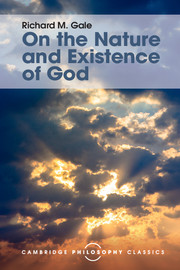Book contents
- Frontmatter
- Dedication
- Contents
- Preface to this edition
- Acknowledgments
- Introduction
- Atheological arguments
- 1 Atheology and the nature of God
- 2 The creation–immutability argument
- 3 The omniscience–immutability argument
- 4 The deductive argument from evil
- 5 The argument from world-relative actuality
- Theological arguments
- Index
2 - The creation–immutability argument
from Atheological arguments
Published online by Cambridge University Press: 05 July 2016
- Frontmatter
- Dedication
- Contents
- Preface to this edition
- Acknowledgments
- Introduction
- Atheological arguments
- 1 Atheology and the nature of God
- 2 The creation–immutability argument
- 3 The omniscience–immutability argument
- 4 The deductive argument from evil
- 5 The argument from world-relative actuality
- Theological arguments
- Index
Summary
This argument is a dramatic case in point of the thesis of Chapter 1 concerning the positive role of the atheological arguments; for Saint Augustine's famed theory of the relation between God's eternality and the temporality of the created world, which was accepted by all of the subsequent great medieval theists and became official church doctrine, was developed in response to it. Furthermore, the account of time that falls out of his theory has gained widespread acceptance down to the present day. It will be shown that this account of time itself forms the basis of an atheological argument. Had its import been understood by his Christian followers, they would have tarred and feathered rather than sainted him. The notion of God's eternality then will be subject to critical scrutiny and will be shown to render him a nonperson and thereby not religiously available.
In Book 11 of his Confessions, in which he develops this theory of time and eternity, Augustine begins with this Manichaean formulation of the creation–immutability argument:
Lo are they not full of their old leaven, who say to us, “What was God doing before He made heaven and earth?” “For if (say they) He were unemployed and wrought not, why does He not also henceforth, and for ever, as He did heretofore? For did any new motion arise in God, and a new will to make a creature, which He had never before made, how then would that be a true eternity, where there ariseth a will, which was not?”
The following is an explicit mounting of this argument, with 1–3 comprising the initial set:
1. The world came into existence at some past time, say t0;
2. The world exists at some time if and only if God wills that it does;
3. God is immutable;
4. At t0 God wills that the world exist [from 1 and 2];
5. There are times earlier than t0, say t-1, at which the world does not exist [from 1];
6. At t-1 God does not will that the world exist [from 2 and 5];
7. God has a property at one time that he lacks at another [from 4 and 6];
8. God is not immutable [from 7]; and
9. God is immutable, and God is not immutable [from 3 and 8].
- Type
- Chapter
- Information
- On the Nature and Existence of God , pp. 31 - 46Publisher: Cambridge University PressPrint publication year: 2016



